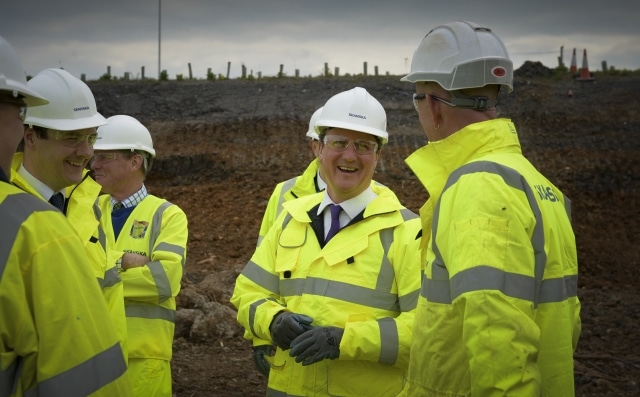The government’s cuts to renewable energy subsidies will leave the industry “in limbo” and send a “worrying signal” about the UK’s commitment to tackling climate change ahead of the Paris climate conference, warns Angus Macneil, chair of the Energy and Climate Change Committee.
The Department of Energy and Climate Change (DECC) has seen an intense backlash from industry, analysts, and politicians as it works to cut the “green crap” in what it claims to be an effort to keep down household bills – the latest being yesterday’s announcement by Amber Rudd, head of DECC, to cut solar subsidies.
Reacting to the news, Macneil said: “The measures announced by the Department of Energy and Climate Change today raise more alarming questions for investors in low carbon, renewable technologies who are already struggling to finance projects after a series of sudden policy changes.”
On Wednesday, Macneil and fellow committee members questioned Rudd during the Energy and Climate Change Committee inquiry into DECC’s priorities under this parliament. Committee members repeatedly stressed the mounting concern and uncertainty surrounding renewable energy’s role in decarbonisation under the new Conservative Government.
“The latest changes remove the current certainty for the lowest cost renewable technologies whilst failing to provide any indication of the future investment landscape,” Macneil said yesterday.
Decarbonisation Targets
Rudd’s announcement was widely expected, and comes off the back of recent projections from the Office for Budget Responsibility that subsidies for renewable energy will exceed the levels expected at the point when the spending cap – known has the Levy Control Framework (LCF) – was established.
While DECC has now promised to set out the amount within the LCF beyond 2020, it has not specified when it will do this. Macneil said that by giving “no indication of when it will provide this information, [it leaves] industry in limbo.”
“Removing support for the lowest cost renewable technologies calls into question once more the Government’s commitment to meeting our medium- and long-term decarbonisation targets, sending out a worrying signal in the run up to the Paris climate change conference,” he added.
“I am disappointed that the Government has made these announcements after the House of Commons has risen for the summer recess, as proper scrutiny in Parliament will now not be possible until after the consultation deadlines.”
Ideology Not Evidence
Leonie Greene, head of external affairs at the Solar Trade Association, said: “There is a danger if government pulls the rug on solar farms too early, the market will have nowhere to go… What we need is a bridging strategy and we are very keen to work with DECC to achieve that.”
Speaking to Carbon Brief, Ed Davey, former Liberal Democrat secretary of state for energy and climate change, said: “It would appear that the Conservatives are taking an anti-renewables stance based on ideology, not on evidence.”
“I speak as someone who cut subsidies to wind and solar,” Davey continued. “I want subsidies to go in the end, because I believe strongly that low-carbon green technologies will be able to survive on their own.
“But the question is when you cut the subsidies, how quickly you cut the subsidies and whether you used evidence in that decision or whether you made it on the basis of crude ideology. My fear is that this is more Treasury and Osborne led than evidence and DECC led.”
‘Two Governments’
Others commenting on the move include Michael Grubb, professor of international energy and climate change policy at University College London. He said: “This is a pivotal moment in UK energy policy, on which it is beginning to look like the UK has two governments. One is that pressing for strong international action on climate change, which signed an unambiguous cross-party pledge to phase out unabated coal, reiterated its carbon targets and which committed in its manifesto to deliver clean renewable energy as cost-effectively as possible.
“The other is a government which has moved to prematurely end supports for the cheapest of the UK‘s main renewable resources, which has injected fear and uncertainty into renewable energy investors – and which seems set to also scrap energy efficiency programmes which have helped to cut consumer bills and avoided the need for billions of pounds of new fossil fuel investments. Sooner rather than later David Cameron must clarify which government he is really leading.”
Meanwhile, Greg Barker, former Conservative minister of energy and climate change, provided a voice of optimism as he stressed that “we need to focus on the fact that this review is a response to much faster and more successful clean energy deployment than anyone expected; exceptional growth that has made the UK the fastest growing solar market in Europe.”
He continued: “The government needs to listen very carefully to the most progressive voices in the sector and to focus the remaining budget in the right place but also work with the industry to help solar entrepreneurs create value with new and enhanced business models and by unblocking other barriers to growth.”
Photo: Number 10 via Flickr
Subscribe to our newsletter
Stay up to date with DeSmog news and alerts






